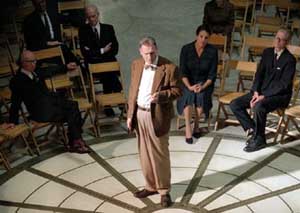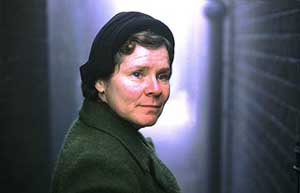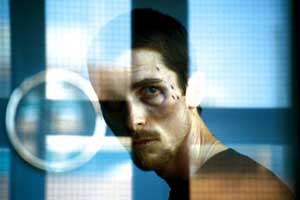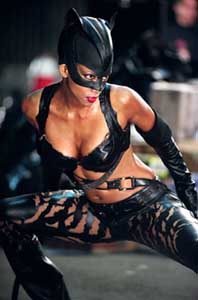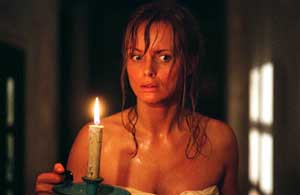Arts & Entertainment
2004’s best and worst movies
‘Kinsey’? ‘Vera Drake’? ‘Sideways’? It wasn’t as bad a year as you may have thought
Published Thursday, 30-Dec-2004 in issue 888
For this film reviewer, 2004 began with the Jan. 5 screening of the wild, ground-breaking Japanese animated tale Tokyo Godfathers (one of the characters is a drag queen) and ended Dec. 20 with The Woodsman, a stark skin-crawler about a convicted child molester (a superb Kevin Bacon). Say what you will about the declining state of cinema (are any other popular art forms not experiencing an erosion in quality?), 2004 was a year of impressive diversity for movies.
To further illustrate this point, last week the San Diego Film Critics Society (I served as its 2004 president) honored Mike Leigh’s compelling period drama Vera Drake for Best Picture, Actress, Supporting Actor and Original Screenplay, while giving the Best Director nod to Clint Eastwood for Million Dollar Baby (he also took home Best Original Score). Best Actor? Jim Carrey, for Eternal Sunshine of the Spotless Mind. (No, that’s not a typo: J-I-M C-A-R-R-E-Y.) Other winners included Phantom of the Opera and Hero (co-winners, Best Cinematography), Sideways (Best Adapted Screenplay) and The Sea Inside (Foreign Language film) – all very different from one another.
While there were some wonderful documentaries in 2004 (much to my joy, Jonathan Caouette’s stream-of-consciousness video journal, Tarnation, took home Best Documentary), it was a disappointment in terms of foreign films and – it’s painful to have to say this for the second year in a row – narrative-driven gay and lesbian-themed films. (Even Pedro Almodovar’s Bad Education was a misfire, in my opinion; perhaps I need to watch it again to see what I missed.) Proteus was far and away the most interesting G&L offering, though it hardly obliterated memories of flops like A Touch of Pink and Testosterone. But we can always hope that 2005 will be better, right boys and girls?
Here are the films that moved and provoked me – and in some cases made me want to tear out my hair.
The best movies of 2004:
1. Zero Day. Only about three people in San Diego saw writer-director Ben Coccio’s startlingly original, wholly convincing video diary abut two “best buds” who meticulously plan a Columbine-style shooting at their high school and document the entire incident on video. Coccio and his (largely amateur) actors do such an amazingly realistic job, you’d swear Zero Day was an actual documentary – even I was fooled (and I don’t mind admitting it).
2. The Machinist. Writer Scott Kosar and director Brad Anderson (Next Stop Wonderland) teamed for this ominous, nerve-jangling psychological horror movie about a guilt-ridden machinist (Christian Bale, who lost 63 pounds for the role) whose increasing paranoia is destroying what’s left of an already solitary life. Superbly shot and scored (the composer was Roque Banos), it’s made particularly memorable by Bale’s audacious, go-for-broke performance. Again, this is one of those films hardly anyone saw (while Dodgeball grossed over 100 million bucks – I feel the hair on my neck standing on end).
3. Vera Drake. “Wife. Mother. Criminal.” So reads the ingenious tagline for Vera Drake, Mike Leigh’s monumentally moving tale of a well-meaning domestic (Imelda Staunton, in the performance of a lifetime) who assists young girls “in the family way” until one of her clients almost dies and the police get wind of her illegal dealings. Phil Davis is understated genius as Vera’s husband; he may not agree with what Vera has done, but loves her too much not to support her after she’s arrested.
4. Kinsey. A literate, informative, bold-talking examination of the life of sex researcher Alfred Kinsey (only slightly white-washed), Kinsey, written and helmed by Oscar-winner (Gods and Monsters) Bill Condon, is one of those involving biopics you don’t see much any more: funny, intelligent, superbly performed (by Liam Neeson, Laura Linney, Peter Sarsgaard and others), and incredibly frank when it comes to the subject of sex. Will Condon take home another Oscar for his work? I’ve got my fingers crossed.
5. A Home at the End of the World. Michael Cunningham, the man who gave us the sublime The Hours, adapted his book of the same name, an uncommonly tender story (sensitively directed by fledgling filmmaker Michael Mayer) of three misfits and their 12-years-long, three-way love affair (no man-on-man sex, though there is some melt-in-your-mouth kissing between Colin Farrell and co-star Dallas Roberts). Farrell (handsomer than ever, once he loses the bad wig), Roberts and Robin Wright Penn (in a wonderfully colorful turn) create an unforgettable portrait of three friends whose relationships are continuously tested by tumultuous life events.
6. Tarnation. The maddening, brilliant, self-indulgent, transfixing Tarnation, Jonathan Caouette’s warts-and-all “home movie” detailing 20 years of life with his mentally disturbed mother (eventually diagnosed with bipolar syndrome), is a great documentary that truly invigorates the art form. Caouette made it for a mere $218 on his iMac, an achievement in its own right.
7. The Sea Inside. AlI I knew about The Sea Inside was that this Spanish-language drama, written (with Mateo Gill) and directed by Alejandro Amenabar, had something to do with “death and dying,” and that it starred the exceptional Spanish actor Javier Bardem. For nearly 30 years, Spanish quadriplegic Ramon Sampedro campaigned for the right to terminate his life, only to be repeatedly turned down by the courts. Finally, Sampedro decided to take matters into his own hands. Bardem as always, is amazing; The Sea Inside is altogether haunting – and couldn’t be more timely.
8. Sideways. Some of my friends simply don’t “get” Alexander Payne’s movies (Election, About Schmidt), but for my money he’s one of America’s best independent writer-directors. Here he and writing partner Jim Payne have marvelously adapted Rex Pickett’s novel of the same name, about two middle-aged buddies (Paul Giamatti and Thomas Haden Church, who have great chemistry) who go off to Napa’s wine country to celebrate Church’s last week of freedom before he gets hitched. What follows is so true, so chock full of sly observations about men’s unwillingness to grow up (see Finding Neverland), you could (almost) be watching a documentary. Giamatti’s meltdown at a posh wine-tasting event is one of 2004’s greatest scenes.
9. Finding Neverland. When I first saw Marc Forster’s Finding Neverland, adapted by David Magee from Allan Knee’s play about Peter Pan author J.M. Barrie, I recall thinking, “Sweet but unexceptional.” The second time I saw it, I was amazed to find myself blubbering like an extra in the funeral scene from Lana Turner’s Imitation of Life. Just because a movie makes one cry doesn’t mean it’s necessarily any good, of course, but Finding Neverland truly is a lovely piece of work: low-key, gentle and “feel good” in a way that doesn’t insult your intelligence (and it’s PG-13!). Johnny Depp (terrific as Barrie) is flanked by some wonderful actors, including Kate Winslet, Julie Christie and the astonishing Freddie Highmore (Peter), who beautifully captures young Peter’s damaged soul.
10. Super Size Me. Not only is Morgan Spurlock’s hilariously inspired documentary –about an ordinary Joe (Spurlock) who goes on an “all-McDonalds diet” for a month to show how unhealthy it is to consume too much fast food – immensely entertaining, it’s the most damning trashing yet of the fast-food industry. (Why pick on McDonalds? Hmm… maybe because, as the biggest of the burger chains, they’re most responsible for teaching children poor eating habits and contributing to the shockingly high rate of obesity in America.) Spurlock (who wrote and directed) turns out to be an ingratiating guide as he stuffs himself (to the point of illness) three times a day with Ronald McDonald’s fat and sugar-laden menu offerings.
The worst:
1. Catwoman. Halle Berry has never looked better, but that’s the only good thing I can say about this botched action-adventurer starring the conflicted DC Comics heroine (played previously by a number of other actresses, including Michelle Pfeiffer). When a mousy artist is turned into an abs-of-steel hottie with enhanced feline qualities, she decides to put that S&M Halloween costume to use and engage in a little late-night crime-fighting. Spotted at the scene of a jewelry heist she interrupts, the cops think she’s in on the robbery, and the fun begins. Well, actually, no it doesn’t, because Catwoman is barely any fun at all (the CGI work is appalling). Working with a script fashioned by no fewer than six people, hip French director Pitof tries – and fails, spectacularly – to make a silk purse out of what is unquestionably a sow’s ear. Gothika was a lot more enjoyable.
2. The Dreamers. Sadly, no one had the guts to tell esteemed French filmmaker Bernardo Bertolucci (The Last Emperor, The Conformist) not to make The Dreamers, a cringe-inducing, voyeuristic NC-17 drama about an incestuous French brother and sister who befriend (and play sexual games with) a wide-eyed American boy (Michael Pitt) visiting France. Setting the film against the backdrop of a turbulent Paris, circa 1968 (the year of the student riots), seems like nothing more than Bertolucci’s desperate attempt to give his soft-core porn romp some much-needed substance.
3. A Thousand Clouds of Peace. In writer-director Julian Hernandez’s execrable indie feature, 17-year-old Gerardo prowls the streets of Mexico City looking for sex (but he really wants a relationship – yeah, right). He’s carrying a torch for his ex, Bruno, but Bruno isn’t the marrying kind and has left him at the altar. Gerardo’s response to being blown off (so to speak) by his true love? Cruise men and have unprotected sex with tricks who beat him up. Fiction or not, I can’t imagine a more inappropriate, politically dangerous view of young, gay adulthood.
4. The Girl Next Door. As a movie critic, I’ve pretty much seen it all, but even I was taken aback by the ugly, sexist premise of Luke Greenfield’s The Girl Next Door. In this tasteless teen “comedy-romance,” concocted by four different screenwriters, a voluptuous ex-porno star, Danielle (Elisha Cuthbert), moves in next door to serious student Matthew Kidman (Emile Hirsch). When his drooling, mammary-glands-obsessed buddies figure out her identity, Matt’s popularity rating at school goes sky-high. (Brains? Good grades? What are those?) This is high-gloss trash, dishonestly masquerading as self-empowerment for young girls. A total disgrace.
5. Exorcist: the Beginning. I had hopes for this Exorcist “prequel,” but even an almost complete re-shoot (by Renny Harlin) failed to make it palatable. Disillusioned priest Mister Merrin (Stellan Skarsgard, who bravely filmed the entire movie twice when Warner Bros. decided Paul Schrader’s version wasn’t scary enough) visits a Kenyan village in the late 1940s, hired by the Church to ascertain what is making the local villages go stark raving mad. Could, um, Satan be behind it all? The crazed hyena attack on a little boy is quite disturbing, but all the other “shocks” either have little to no payoff or are just plain laughable. Let’s hope that Exorcist: The Beginning is the end of this once-promising franchise.
6. The Punisher. Another bungled super-hero adaptation (this one from Marvel), with the very hot Tom Jane (yes, he’s no longer “Thomas” – stop the presses) as the crime-fighter without super-powers (he’s just good at kicking ass). When his family is massacred at a family reunion (could there be a more tired plot?), the big, bad Punisher goes into action to exact bloody revenge. Grisly, violent and a big step down for Tom Jane (excellent in Stander, a film that, sadly, came and went in a week). And I thought Dreamcatcher was putrid.
7. The Polar Express. As an animation buff, I greatly appreciate what underappreciated writer-director Robert Zemeckis tried to accomplish with this 100-percent CGI-animated adaptation of Chris Van Allsburg’s popular, slightly- built children’s book. While some of the sequences (in the best, a little girl’s ticket flies out the train window and goes on a journey all its own) are breathtaking, Polar Express is painfully bereft of charm. It’s also overdone in the extreme: noisy, padded (the book is only about 30 pages, and the film runs almost two hours) and ear-splittingly loud. And then there's the problem of the kids (blind? mentally disabled? I wasn’t sure at first), who look … weird. Village of the Damned weird. Sorry Bob, the technology simply isn't there yet.
8. Alfie. I was secretly thrilled Alfie took a nosedive at the box-office (I left early myself) because of what it celebrates: hedonism and superficiality (while trying to be more “sensitive” than the version that made Michael Caine a star). Alfie (Jude Law, attired in some fine threads) is a total skirt magnet, and can have a different babe every night. (He can even wear pink shirts without anyone questioning his sexuality. What a guy!) This type of “love-‘em-and-leave-‘em” protagonist may once have been the rage, but now Alfie seems like a dangerous anachronism. It seems that no one associated with Alfie has ever heard of condoms, much less AIDS.
9. The Final Cut. Writer-director Omar Naim’s The Final Cut is a godawful suspense thriller that could have been so much more, given its clever premise. Set in the future, Robin Williams (in milquetoast mode) plays Alan Hakman, a “cutter” who edits together (for a fat fee, of course) the highlights of dead people’s lives (courtesy of memory implants), to be shown at their memorial service. But wait! One client’s reel shows him doing some very, very bad things. Now Alan is in danger because he won’t turn over the tape! Need I go on about this dreck?
10. She Hate Me. I shuffled out of Spike Lee’s She Hate Me with what could only be described as a look of incredulity on my face. Could this be the work of the same man who set the cinematic world ablaze with Do The Right Thing? When Jack (Anthony Mackie) is sacked for whistle-blowing at his job, he finds a new way to make money: impregnate lesbians. (The poster’s priceless tagline: “One heterosexual male. Eighteen lesbians. His fee: $10,000... each.”) The idea alone is beyond offensive, but Lee makes it worse by treating lesbians as some sort of alien race (almost all of whom look like fashion models). And shouldn’t Lee of all people know better than to lean on such a culturally stereotypical premise? (Jack can go for hours, even without Viagra, because, well, black men are all super studs.) Easily the worst film of Lee’s ever-faltering career.
Parting glances:
In desperate need of some time off: Angelina Jolie, Jude Law, Halle Berry, Ben Affleck
Best line of dialogue (from the universally maligned Troy): “War is old men talking and young men dying.” (You listening, George W.?)
See you at the movies in 2005.
Kyle Counts is the film critic for the Gay & Lesbian Times
|
|
Copyright © 2003-2025 Uptown Publications

